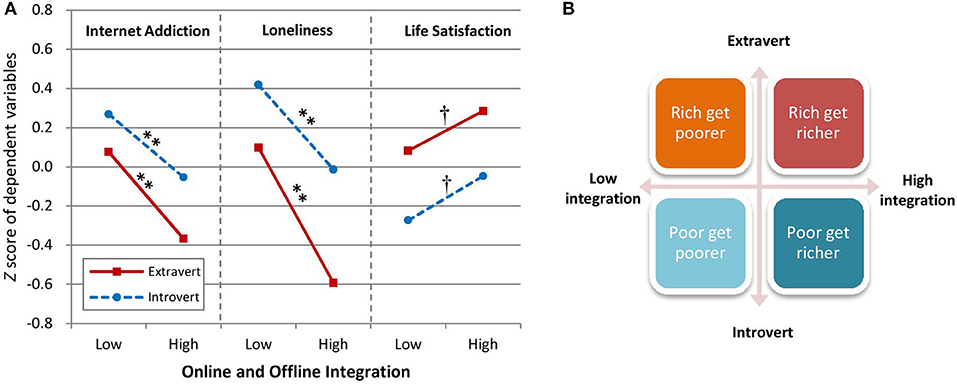- 1Department of Applied Psychology, School of Humanities and Social Sciences, Fuzhou University, Fuzhou, China
- 2Department of Sociology, Peking University, Beijing, China
- 3Institute of Psychological and Cognitive Sciences, Fuzhou University, Fuzhou, China
- 4Department of Psychiatry, Child Study Center, Department of Neuroscience, and the National Center on Addiction and Substance Abuse, Yale School of Medicine, New Haven, CT, United States
- 5Connecticut Mental Health Center, New Haven, CT, United States
A Corrigendum on
Development of an Online and Offline Integration Hypothesis for Healthy Internet Use: Theory and Preliminary Evidence
by Lin, X., Su, W., and Potenza, M. N. (2018). Front. Psychol. 9:492. doi: 10.3389/fpsyg.2018.00492
In the original article, there was a mistake in Figure 3A as published. Due to a drawing error, the line style of introvert and extravert in the panel of “Loneliness” was drawn incorrectly. The corrected Figure 3 appears below.

Figure 3. Integration, extraversion, and their psychological correlates. (A) Mean Z score of Internet addiction, loneliness, and life satisfaction as a function of online/offline integration (low or high) and extraversion (extraverted or introverted). (B) Diagram of the psychological effects of different online and offline integration levels for extraverts and introverts. †p < 0.1, *p < 0.05, **p < 0.01.
The authors apologize for this error and state that this does not change the scientific conclusions of the article in any way. The original article has been updated.
Conflict of Interest Statement
The authors declare that the research was conducted in the absence of any commercial or financial relationships that could be construed as a potential conflict of interest.
Keywords: integration hypothesis, integration principles, rich get richer, social compensation, Internet addiction, problematic Internet use, healthy Internet use, online and offline integration scale
Citation: Lin X, Su W and Potenza MN (2019) Corrigendum: Development of an Online and Offline Integration Hypothesis for Healthy Internet Use: Theory and Preliminary Evidence. Front. Psychol. 10:106. doi: 10.3389/fpsyg.2019.00106
Received: 29 November 2018; Accepted: 14 January 2019;
Published: 31 January 2019.
Edited and reviewed by: Peizhen Sun, Jiangsu Normal University, China
Copyright © 2019 Lin, Su and Potenza. This is an open-access article distributed under the terms of the Creative Commons Attribution License (CC BY). The use, distribution or reproduction in other forums is permitted, provided the original author(s) and the copyright owner(s) are credited and that the original publication in this journal is cited, in accordance with accepted academic practice. No use, distribution or reproduction is permitted which does not comply with these terms.
*Correspondence: Wenliang Su, c3V3ZW5saWFuZ0BmenUuZWR1LmNu
†These authors have contributed equally to this work
 Xiaoyan Lin
Xiaoyan Lin Wenliang Su
Wenliang Su Marc N. Potenza
Marc N. Potenza